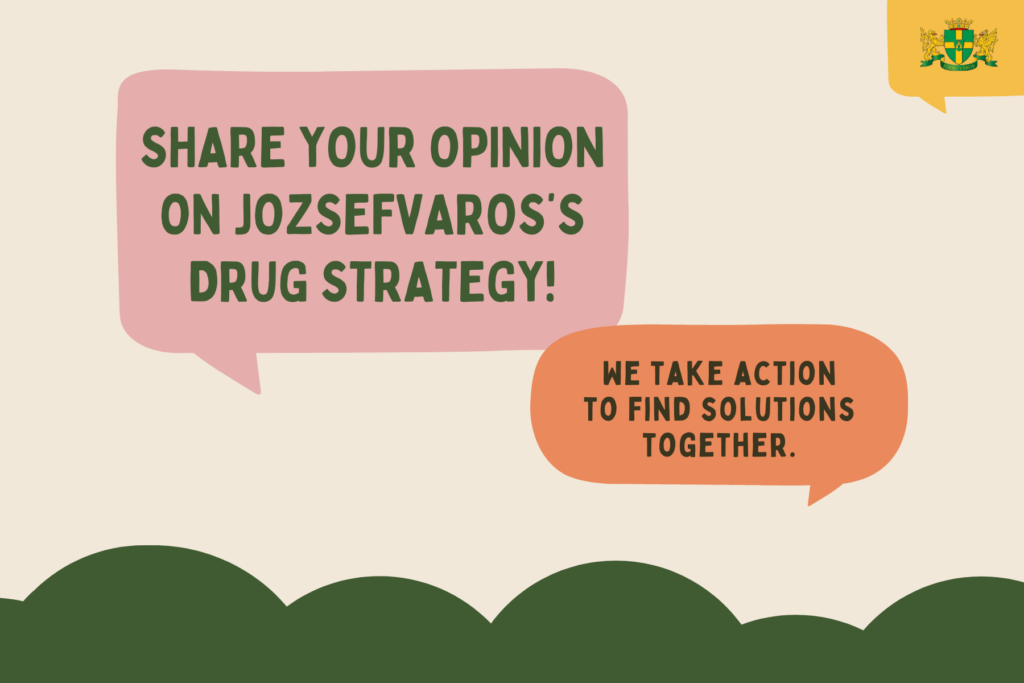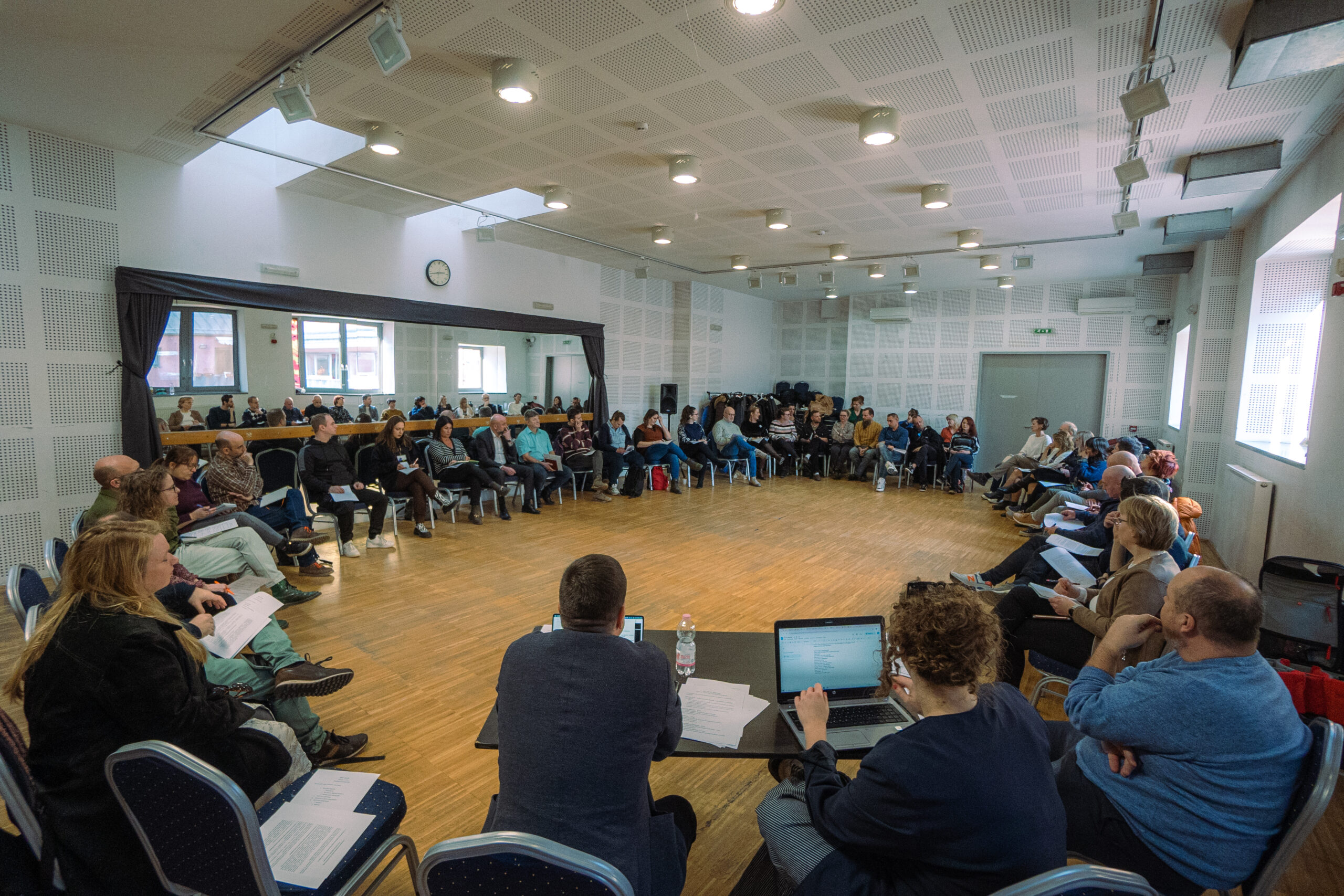The Municipality of Józsefváros has developed its Drug Strategy, aiming to address the issues related to addictions that are present in the district and affect all of our lives.
Addiction does not only impact the individual, but also families, residential communities, and ultimately, society as a whole.
The strategy is based on the principle that drug-related problems cannot be tackled solely through law enforcement measures — it requires the coordinated operation of four pillars: prevention, treatment, harm reduction, and supply reduction (law enforcement). Therefore, the document represents a comprehensive approach, built on the cooperation of professionals, civil society, people affected by addiction, and local communities.
With this strategy and related actions, the Municipality aims to foster a safer, more inclusive, and more supportive community in Józsefváros.
Read the full document here:
Summary of the Drug Strategy
The completed strategy first describes the establishment, members, and activities of the Józsefváros Drug Coordination Forum (Józsefvárosi Kábítószerügyi Egyeztető Fórum/JKEF).
It then lays out the strategy’s principles, goals, and guidelines. To map the local drug situation, the Municipality also commissioned a research study, the results of which are included in the document.
After that, the strategy discusses the four key pillars:
What are these pillars?
For an effective drug policy, it is essential that the four pillars — prevention, treatment, harm reduction, and supply reduction — work together in a coordinated manner.
Prevention
Prevention aims to stop diseases, addictions, and harmful habits before they appear. It helps preserve physical and mental health, improves quality of life, and contributes to a longer, healthier life. Prevention includes promoting a healthy lifestyle, providing accurate information, and developing coping skills.
In Hungary, there is currently a shortage of professionals and programs applying modern, evidence-based methods, which often limits the effectiveness of prevention. Therefore, a change in approach is needed, supporting more effective and accessible preventive activities for everyone.
What does the strategy recommend for prevention?
- Strengthening the preparedness and support of local professionals:
Providing continuous training, professional support, and educational materials for teachers, social workers, health visitors, and youth professionals working with young people. - Renewing prevention methodologies and expanding programs:
Introducing modern, interactive, and evidence-based programs covering both legal and illegal substances, and encouraging community initiatives involving civil organizations, businesses, parents, and residents.
Harm Reduction
The goal of harm reduction is to mitigate the health and social damages associated with drug use and to protect the lives and health of users.
Currently, Józsefváros lacks low-threshold services and street outreach programs, meaning that the most vulnerable groups do not have access to help. As a result, drug litter appears in public spaces, posing serious public health risks — although JGK Zrt. (Józsefváros Management Centre Private Limited Company) regularly collects needles to manage the situation.
The strategy pays special attention to supporting groups who, due to their social situation or minority status, face additional barriers to accessing care.
What does the strategy recommend for harm reduction?
- Strengthening professional capacity and support in harm reduction:
Introducing specialized training, supervision, and mentoring systems for local social professionals, creating professional materials and online platforms, and providing basic information to non-social field workers (e.g., police, public space supervisors, JGK Zrt.). - Developing harm reduction tools and services:
Launching low-threshold and outreach programs in cooperation with civil organizations, providing harm reduction supplies, and creating easy-to-understand guides about local support options. - Community involvement and addressing specific needs:
Supporting programs tailored to minority and disadvantaged groups, providing temporary childcare, and organizing sensitivity training for addiction professionals.
Treatment, Care and Recovery
In Józsefváros, the connection between drug users and care institutions is often weak, and access to addiction services faces many obstacles. Developing integrated care is particularly important for people with dual diagnoses.
The Spirál Recovery Center supports rehabilitation through individual and group programs, fieldwork development, and specialized activities. Raising public awareness about available help is also a key goal.
What does the strategy recommend for treatment, care, and recovery?
- Clarifying service pathways and strengthening cooperation among providers:
Ensuring the active operation of the Józsefváros Drug Coordination Forum (JKEF), clarifying referral routes, creating a joint database of local services, and supporting integrated programs for people with dual or multiple diagnoses. - Improving the addiction services of Józsefváros Szent Kozma Health Centre (Józsefvárosi Szent Kozma Egészségügyi Központ/JEK):
Relocating the Addictology Department to an easily accessible, discreet location to reduce stigma and encourage help-seeking. - Developing the services of the Spirál Recovery Center:
Increasing client engagement through fieldwork and low-threshold services, aligning programs with local needs, and initiating regular professional consultations among service providers. - Strengthening clear communication and public information:
Creating comprehensive and concise information materials, organizing public events, and cooperating with primary care professionals to improve access and early detection.
Supply Reduction
In the case of illegal substances, preventing drug trafficking and reducing supply are primarily law enforcement responsibilities. However, close cooperation with the Municipality and local institutions is crucial.
Law enforcement actions are essential but not sufficient on their own, as drug demand is often driven by social and economic problems.
Organizations responsible for public safety often lack information on where and how users can access help. Residents also have a legitimate need to share their experiences and make reports that lead to visible action — but this requires adequate human resources within both the police and the Public Space Supervision Department.
What does the strategy recommend for supply reduction?
- Strengthening cooperation and information flow:
Maintaining the active operation of the Józsefváros Drug Coordination Forum (JKEF), organizing regular meetings, coordinating the work of public safety bodies (police, public space supervisors, district guards), and continuing cooperation with the district police headquarters. - Supporting preparedness and referral systems:
Organizing training for police officers and public space supervisors on recognizing substance use, understanding different drugs, and available support options. Strengthening cooperation between law enforcement and social work, and preparing clear, accessible information materials for both residents and users. - Community communication and trust-building:
Providing clear ways for residents to submit reports, and presenting law enforcement measures and results in reducing drug supply at forums, public events, and online platforms to increase transparency and trust.
Read the full document here:
Share Your Opinion!
Between 10 November and 7 December 2025, the Józsefváros Drug Strategy will be open for public consultation.
How can you share your opinion?
- Online: by filling out this form – http://jozsefvaros.hu/go/drugstrategy_survey
Are you a local resident affected by substance use?
During the consultation period, several easy-to-understand sessions will be held for affected residents in cooperation with partner organizations, where participants can share their feedback on the strategy.
Are you representing a professional organization?
If you did not attend the September 2025 Józsefváros Drug Coordination Forum (JKEF) meeting where the draft was discussed, you can still submit written feedback until 7th December.
What happens after the consultation?
After the consultation closes, the Municipality reviews all submitted comments and suggestions, then decides whether to accept, partially accept, or reject each proposal, providing justification in every case. Accepted and partially accepted suggestions will be incorporated into the strategy. The Municipal Council will then decide on the strategy at the beginning of next year. After the decision, the final strategy and a summary of the consultation results will be published on our website.
For further information:
KEF Coordinator:
Róza Cseh – cseh.roza@jozsefvaros.hu
In February 2025, the Józsefváros Drug Coordination Forum (JKEF) was re-established. The goal of the KEF is to coordinate and support the work of local service providers, authorities, and institutions involved in addressing drug-related issues. Learn more about the KEF’s work here:




